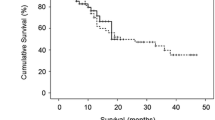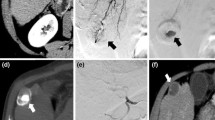Abstract
Purpose
To evaluate the safety, clinical outcomes, and hepatic artery damage after transcatheter arterial chemoembolization (TACE) with epirubicin-loaded superabsorbent polymer microspheres (ELM-TACE) in patients with hepatocellular carcinoma (HCC) in a single center in Japan.
Materials and Methods
This embolic agent is the original form of microspheres, which has the same composition and nature as HepaSpheres. Between May 2007 and June 2009, 135 patients with unresectable HCC who underwent ELM-TACE were enrolled. Embolization through extrahepatic collaterals was performed in 27 (20.0%) patients. Tumor response was evaluated using European Association for the Study of the Liver criteria at 1 and 6 months after initial ELM-TACE.
Results
All procedures were successfully performed. The median number of TACE per patient was 1.7 sessions (range 1–5), and the mean epirubicin dose per session was 19.7 mg (range 2.0–60.0). Local pooling within target tumors was observed during TACE in 34 (25.2%) patients, and in 14 (10.4%) of the patients, gelatin sponge particles were added after the microspheres until each pooling disappeared. No serious adverse events associated with TACE occurred, and the incidence of postembolization syndrome was ≤17.8%. The 1- and 6-month tumor response rates were 56.3 and 52.6%, respectively. The overall 1- and 2-year survival rates were 73.7 and 59.0%, respectively. Among 99 evaluated patients, 90 (90.9%) were found to have no hepatic artery damage after initial ELM-TACE.
Conclusion
ELM-TACE is safe and effective treatment for unresectable HCC and is associated with low frequency of postembolization syndrome and minimal damage to the hepatic artery.



Similar content being viewed by others
References
El-Serag HB, Rudolph KL (2007) Hepatocellular carcinoma: epidemiology and molecular carcinogenesis. Gastroenterology 132:2557–2576
Bruix J, Sherman M, Llovet JM et al (2001) Clinical management of hepatocellular carcinoma. Conclusions of the Barcelona-2000 EASL conference. European Association for the Study of the Liver. J Hepatol 35:421–430
Bruix J, Llovet JM (2002) Prognostic prediction and treatment strategy in hepatocellular carcinoma. Hepatology 35:519–524
Llovet JM, Bruix J (2003) Systematic review of randomized trials for unresectable hepatocellular carcinoma: chemoembolization improves survival. Hepatology 37:429–442
Llovet JM, Real MI, Montana X et al (2002) Arterial embolization or chemoembolization verses systemic treatment in patients with unresectable hepatocellular carcinoma: a randomized controlled trial. Lancet 359:1734–1739
Brown DB, Cardella JF, Sacks D et al (2009) Quality improvement guidelines for transhepatic arterial chemoembolization, embolization, and chemotherapeutic infusion for hepatic malignancy. J Vasc Interv Radiol 20(Suppl 7):S219–S226
Satake M, Uchida H, Arai Y et al (2008) Transcatheter arterial chemoembolization (TACE) with lipiodol to treat hepatocellular carcinoma: survey results from the TACE study group of Japan. Cardiovasc Intervent Radiol 31:756–761
Cammà C, Schepis F, Orlando A et al (2002) Transarterial chemoembolization for unresectable hepatocellular carcinoma: meta-analysis of randomized controlled trials. Radiology 224:47–54
Chang JM, Tzeng WS, Pan HB et al (1994) Transcatheter arterial embolization with or without cisplatin treatment of hepatocellular carcinoma. A randomized controlled study. Cancer 74:2449–2453
Kawai S, Okamura J, Ogawa M et al (1992) Prospective and randomized clinical trial for the treatment of hepatocellular carcinoma: a comparison of lipiodol-transcatheter arterial embolization with and without adriamycin (first cooperative study). The Cooperative Study Group for Liver Cancer Treatment of Japan. Cancer Chemother Pharmacol 31(Suppl):S1–S6
Maeda N, Osuga K, Mikami K et al (2008) Angiographic evaluation of hepatic arterial damage after transarterial chemoembolization for hepatocellular carcinoma. Radiat Med 26:206–212
Varela M, Real MI, Burrel M et al (2007) Chemoembolization of hepatocellular carcinoma with drug eluting beads: efficacy and doxorubicin pharmacokinetics. J Hepatol 46:474–481
Malagari K, Chatzimichael K, Alexopoulou E et al (2008) Transarterial chemoembolization of unresectable hepatocellular carcinoma with drug eluting beads: results of an open-label study of 62 patients. Cardiovasc Interv Radiol 31:269–280
Grosso M, Vignali C, Quaretti P et al (2008) Transarterial chemoembolization for hepatocellular carcinoma with drug-eluting microspheres: preliminary results from an Italian multicenter study. Cardiovasc Intervent Radiol 31:1141–1149
Poon RT, Tso WK, Pang RW et al (2007) A phase I/II trial of chemoembolization for hepatocellular carcinoma using a novel intra-arterial drug-eluting bead. Clin Gastroenterol Hepatol 5:1100–1108
Kettenbach J, Stadler A, Katzler IV et al (2008) Drug-loaded microspheres for the treatment of liver cancer: review of current results. Cardiovasc Intervent Radiol 31:468–476
Hong K, Khwaja A, Liapi E et al (2006) New intra-arterial drug delivery system for the treatment of liver cancer: preclinical assessment in a rabbit model of liver cancer. Clin Cancer Res 12:2563–2567
Lewis AL, Gonzalez MV, Leppard SW et al (2007) Doxorubicin eluting beads—1: effects of drug loading on bead characteristics and drug distribution. J Mater Sci Mater Med 18:1691–1699
Lammer J, Malagari K, Vogl T et al (2010) Prospective randomized study of doxorubicin-eluting-bead embolization in the treatment of hepatocellular carcinoma: results of the PRECISION V study. Cardiovasc Intervent Radiol 33:41–52
Reyes DK, Vossen JA, Kamel IR et al (2009) Single-center phase II trial of transarterial chemoembolization with drug-eluting beads for patients with unresectable hepatocellular carcinoma: Initial experience in the United States. Cancer J 15:526–532
Osuga K, Hori S, Hiraishi K et al (2008) Bland embolization of hepatocellular carcinoma using superabsorbent polymer microspheres. Cardiovasc Intervent Radiol 31:1108–1116
Lacouture ME, Maitland ML, Segaert S et al (2010) A proposed EGFR inhibitor dermatologic adverse event-specific grading scale from the MASCC skin toxicity study group. Support Care Cancer 18:509–522
Lewis AL, Gonzalez MV, Lloyd AW et al (2006) DC Bead: in vitro characterization of a drug-delivery device for transarterial chemoembolization. J Vasc Interv Radiol 17:335–342
Brown KT, Nevins AB, Getrajdman GI et al (1998) Particle embolization for hepatocellular carcinoma. J Vasc Interv Radiol 9:822–828
Chan AO, Yuen MF, Hui CK et al (2002) A prospective study regarding the complications of transcatheter intraarterial lipiodol chemoembolization in patients with hepatocellular carcinoma. Cancer 94:1747–1752
Shim JH, Park JW, Choi JI et al (2009) Does postembolization fever after chemoembolization have prognostic significance for survival in patients with unresectable hepatocellular carcinoma? J Vasc Interv Radiol 20:209–216
Kim JH, Chung JW, Han JK et al (1995) Transcatheter arterial embolization of the internal mammary artery in hepatocellular carcinoma. J Vasc Interv Radiol 6:71–74
Park SI, Lee DY, Won JY, Lee JT (2003) Extrahepatic collateral supply of hepatocellular carcinoma by the intercostal arteries. J Vasc Interv Radiol 14:461–468
Won JY, Lee DY, Lee JT et al (2003) Supplemental transcatheter arterial chemoembolization through a collateral omental artery: treatment for hepatocellular carcinoma. Cardiovasc Intervent Radiol 26:136–140
Miyayama S, Yamashiro M, Okuda M et al (2010) The march of extrahepatic collaterals: analysis of blood supply to hepatocellular carcinoma located in the bare area of the liver after chemoembolization. Cardiovasc Intervent Radiol 33:513–522
Miyayama S, Yamashiro M, Okuda M et al (2010) Hepatocellular carcinoma supplied by the right lumbar artery. Cardiovasc Intervent Radiol 33:53–60
Geschwind JF, Ramsey DE, Choti MA et al (2003) Chemoembolization of hepatocellular carcinoma: results of a metaanalysis. Am J Clin Oncol 26:344–349
Ikeda M, Okada S, Yamamoto S et al (2002) Prognostic factors in patients with hepatocellular carcinoma treated by transcatheter arterial embolization. Jpn J Clin Oncol 32:455–460
Lladó L, Virgili J, Figueras J et al (2000) A prognostic index of the survival of patients with unresectable hepatocellular carcinoma after transcatheter arterial chemoembolization. Cancer 88:50–57
Conflict of interest
None.
Author information
Authors and Affiliations
Corresponding author
Rights and permissions
About this article
Cite this article
Seki, A., Hori, S., Kobayashi, K. et al. Transcatheter Arterial Chemoembolization with Epirubicin-Loaded Superabsorbent Polymer Microspheres for 135 Hepatocellular Carcinoma Patients: Single-Center Experience. Cardiovasc Intervent Radiol 34, 557–565 (2011). https://doi.org/10.1007/s00270-010-9975-y
Received:
Accepted:
Published:
Issue Date:
DOI: https://doi.org/10.1007/s00270-010-9975-y




